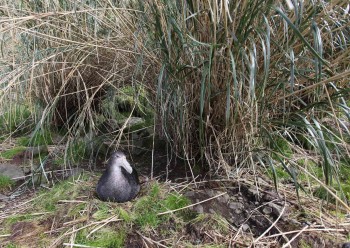A total of 251 incubating pairs of ACAP-listed Southern Giant Petrels Macronectes giganteus was counted at four different localities on the United Kingdom’s Gough Island in the South Atlantic last month by Peter Ryan and colleagues of the University of Cape Town's FitzPatrick Institute. Gough is the most northerly breeding locality for the species.

One of two pairs of Southern Giant Petrels incubating on Long Beach on Gough's east coast in September 2014, photograph by Peter Ryan
The two previous complete-island counts were of 253 incubating pairs in 2012 and 223 in 2013.
Compared to the previous counts, the numbers of breeding birds in Giant Petrel (“GP”) Valley were up, while the numbers in the demographic study colony below Low Hump were down. However, there is no evidence that colour-banded birds from the Low Hump colony move to other breeding sites on the island, so the year-to-year fluctuations may reflect local variations in the numbers of birds missing a breeding year by taking so-called “sabbaticals”.
Unlike for a number of other seabird species on Gough, there are no observations of giant petrel chicks being attacked by introduced House Mice Mus musculus, which might help explain their currently stable population on the island.
Avian research on Gough Island is conducted with the approval of the Tristan Conservation Department and is supported logistically by the South African Department of Environmental Affairs.
With thanks to Peter Ryan for information and the photograph.
Selected Literature:
Cuthbert, R.L., Ryan, P.G. & Cooper, J. 2013. Population trends and breeding success of albatrosses and giant petrels at Gough Island in the face of at-sea and on-land threats. Antarctic Science 26: 163-171.
John Cooper, ACAP Information Officer, 13 October 2014

 English
English  Français
Français  Español
Español